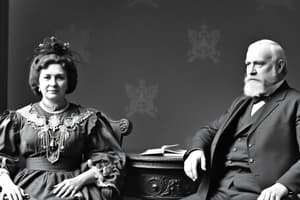Podcast
Questions and Answers
Care a fost un motiv principal pentru imperialismul britanic în perioada 1850-1914?
Care a fost un motiv principal pentru imperialismul britanic în perioada 1850-1914?
- Îmbunătățirea relațiilor internaționale
- Consolidarea unității interne
- Întărirea valorilor religioase
- Accesul la resurse și piețe (correct)
Ce caracteristică era predominantă în societatea victoriană?
Ce caracteristică era predominantă în societatea victoriană?
- Inovații tehnologice radicale
- Equalizarea claselor sociale
- Norme sociale stricte (correct)
- Libertatea socială extinsă
Ce reformă politică a avut un impact semnificativ asupra reprezentării în parlament?
Ce reformă politică a avut un impact semnificativ asupra reprezentării în parlament?
- Limitarea dreptului de vot
- Extinderea suveranității electorale (correct)
- Interzicerea partidelor politice
- Consolidarea puterii monarhice
Ce tip de schimbări sociale au fost promovate ca răspuns la problema industrializării?
Ce tip de schimbări sociale au fost promovate ca răspuns la problema industrializării?
Care era caracteristica principală a peisajului politic britanic în perioada 1850-1914?
Care era caracteristica principală a peisajului politic britanic în perioada 1850-1914?
Flashcards
Imperiul Britanic
Imperiul Britanic
Marea Britanie a devenit o putere globală, având colonii și influență pe mai multe continente, motivată de interese economice și avantaje strategice.
Societatea Victoriană
Societatea Victoriană
Perioada a fost marcată de norme sociale stricte, accent pe moralitate, respectabilitate și sentimentul datoriei, cu o structură social-economică rigidă, dar și semne de mobilitate socială.
Revoluția Industrială
Revoluția Industrială
A continuat să transforme societatea și economia britanică, adusând progrese tehnologice, creștere a manufacturii și infrastructurii.
Reforme Politice
Reforme Politice
Signup and view all the flashcards
Imperialismul Britanic
Imperialismul Britanic
Signup and view all the flashcards
Study Notes
Great Britain 1850-1914: A Summary
- Dominance of the British Empire: Great Britain transitioned from a dominant industrial power to a global empire during this period. This involved extensive colonization and influence across continents, driven by economic interests and strategic advantages.
- Victorian Society Characteristics: The Victorian era was characterized by strict social norms, emphasizing morality, respectability, and a strong sense of duty. A rigid class structure remained, though signs of social mobility emerged. This period also saw advancements in both education and culture, with significant literary and artistic production.
- Industrialization's Impact: The Industrial Revolution continued to transform British society and economy. Significant advancements in technology fueled unprecedented growth in manufacturing and infrastructure. The factory system became widespread, altering working conditions and daily life for many. Rapid urbanization and population shifts marked the growing cities.
- Political Reforms: While not always smooth, gradual political reforms expanded suffrage and participation in government in the 19th century. These reforms significantly impacted representation within parliament and broadened the electorate. Expansion of political power is significant in the context of social change.
- Imperialism and its Motives: Motivations for British imperialism included economic expansion, trade opportunities, strategic geopolitical advantages, and a sense of national superiority. The acquisition of colonies provided access to resources and markets. This was influenced by notions of racial hierarchy and 'civilizing mission,' often justifying British control.
- Political Landscape of this Period: The period saw political parties such as the Conservative and Liberal parties dominate the political landscape. The roles and interactions of these parties shaped political discourse and policymaking, resulting in differing approaches to social and economic issues. Contention and compromise characterized the interplay of these groups.
- Social Reforms: Growing social awareness spurred significant reforms aiming to address issues arising from industrialization and class disparity. These included improvements in working conditions (e.g., factory regulations), education, housing, and public health. The rise of organized labor movements played a crucial role in pushing for these changes, though struggles and inequalities continued.
- Foreign Affairs and Relations: Britain's foreign policy focused on maintaining a balance of power in Europe. Alliances and rivalries with other European powers were significant. Britain's role in global affairs was paramount, given its position as a global power. Its involvement in international conflicts grew in significance.
- Economic Factors: A strong financial sector and thriving international trade sustained the British economy. The London financial market held significant influence. Development and control over key markets across the globe were important considerations. The empire's economic organization was linked to the development of infrastructure and institutions, often in support of trade and resource extraction.
- Technological Advancement and its Societal Impact: Innovations such as the steam engine, telegraph, and later electricity impacted every aspect of British society. Communication networks expanded, and transportation was significantly enhanced. Agricultural developments also aided industrialization.
Specific Aspects of Victorian Society
- Social Hierarchy and Class Structure: Strict class divisions characterized Victorian society, with significant disparity in wealth and opportunity between different social strata. This strongly influenced social interaction and mobility, with limited opportunities for advancement for working classes.
- Gender Roles: Traditional gender roles were deeply ingrained, with expectations of domesticity and limited opportunities for women. A clear division of labor existed along gender lines. However, movements for women's suffrage and rights began to grow impacting the cultural landscape.
- Moral and Religious Values: Victorian society placed a high value on morality and religious principles. This impacted social attitudes, behaviors, and public policy. Religious institutions played an active role in shaping social values and moral discourse.
Conclusion
- The period between 1850 and 1914 represents a significant turning point in British history, marked by industrial expansion, imperial growth, and complex social transformations. The interplay of political, social, and economic factors shaped the nation's trajectory, leaving an enduring legacy on the world stage.
Studying That Suits You
Use AI to generate personalized quizzes and flashcards to suit your learning preferences.




